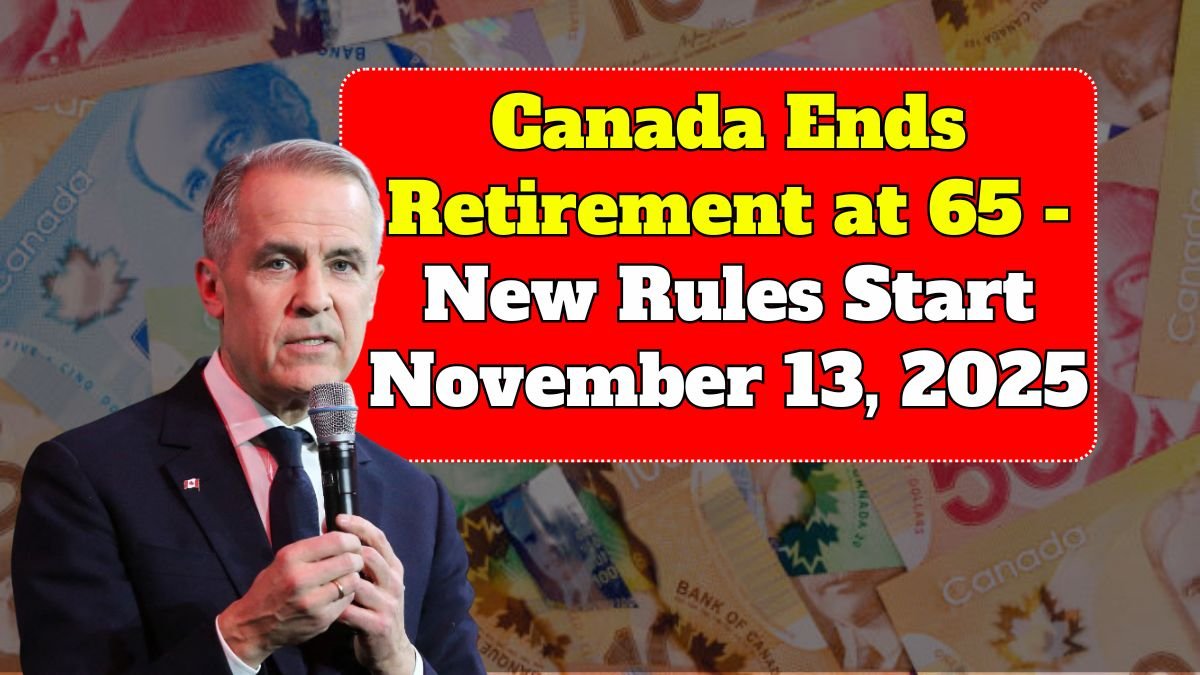Revolutionary and historic development has been accomplished by the Canadian government recently, which the working class would consider as almost miraculous by all definitions in every region of the country. The thumb rule, which used to declare retirement after 65 years, is no longer. Citizens are given options whether they will continue to work or retire at their own convenience; this will take effect on November 13, 2025, and millions from the working category, pensioners, and Social Security beneficiaries will be affected. Let’s get into deep detail about the new decision, what it implies, why it has been created, and more into how it will substantially change the lives of everyday Canadians.
Old Structure of Canada’s Retirement System
In Canada, once you arrive at the age of 65, you have officially retired, and you can now start collecting government benefits such as Old Age Security (OAS) or the Canada Pension Plan (CPP) money.
Retirement at 65 was thought to be a most comfortable and delightful place to be after decades of working, because it opened a window to leisure and financial security. But over the years, this has changed. The rising life expectancy, the economic constraints, and the pressures present in the job market have led the government to revisit this system.
Reason Behind Committee’s Decision to Change Retirement Rules
The Canadian government recognizes that those very soon are becoming healthier, more alive, and even more productive than ever before, wanting to work beyond age 65.
Another major issue plaguing the country is lack of human resources trained and highly skilled. The demand is skyrocketing for skilled workers in the healthcare, education, technology, and service-related industries, and the government wants the experience to continue benefiting the economy.
Thus, the mandatory retirement age of 65 has become transformed from a fixed marker into a flexible option.
New Rules for Retirement
The new rules which come into effect from November 13, 2025, state:
- No Canadian citizen will be forced to retire on account of age.
- Any citizen willing to work past the age of 65 is welcome to do so.
- Retirement for those who choose to do so before the age of 65, however, may come with a cutback in pension amounts/benefits.
This has been tagged as a “Flexible Retirement Policy” by the government, allowing the citizens to make a decision from their perspective in relation to their particular situation in life.
Effects on Pension and Social Security Schemes
Among the most hotly debated questions is the fate of these schemes (for example, OAS and CPP) with no fixed retirement age.
The government assured that these benefits will remain and that citizens may be able to defer or advance these benefits, for example:
- If a person takes CPP at age 67 or 70 instead of 65, their monthly amount would be greater.
- But if one decided to take benefits earlier, then that would be a reduced amount.
In other words, people will have the liberty to plan according to their financial needs.
Emergence of New Opportunities for Senior Citizens
From the new policy perspective, the above change may also be termed as vital; this change is economic, but it is also social. Many elderly citizens can lend their capabilities and experience to whatever discipline they had worked in.
They will see the doors not closing on them in retirement. Rather, they will step into “Active Ageing.”
Many organizations will employ this type of employee in part-time or contract terms so that they could impart their expertise to younger generations.
Economic Effects
The government believes this policy will bolster and stabilize the economy of the country.
Tax income rises as more people choose to continue working, relieving some stress on social assistance schemes.
Also, it creates opportunities in companies for using the expertise of older employees.
This will likely strengthen the economy further.
But some analysts claim that this may deprive youths of some opportunities. However, as part of the intervention, the government has proposed the establishment of some programs for job transition to balance things out.
Effects of New Rules in Private Sector
Most of the private companies were already moving towards flexible retirement schedules. Now, following government prescriptions, these companies will have to change their HR policy.
On the other hand, there would be new healthcare benefits, training programs, and part-time openings, which are additional incentives for keeping workers longer.
Also, there will be changes in pension plans and insurance policies to align with the newly defined age limits.
Responses within Canadian Society
There are mixed reactions concerning this decision in the nation. While senior citizens and the professional field have welcomed it, the others label it as ‘a delayed, soothing decision.’
There are citizens who appreciate it as the freedom to work granted them, while there are others worried about how to guide work at an advanced age could lead them to poor health.
The government further clarified that this is not going to be imposed; it is an outlook. An individual who doesn’t wish to work can retire at 65 or even earlier.
The Government Vision and Future Plans
The government of Canada sees this policy as a significant milestone towards a sustainable economic model for generations to come.
The Ministry of Finance and the Department of Human Resources will work together to ensure the optimal balance between employment and social security for all age groups.
Apart from that, the government is planning to launch a ‘Retirement Plan’ as part of its initiatives. The government is launching an online “Retirement Benefit Calculator”, allowing citizens to determine which option is most suitable for them.
Conclusion
The decision to end retirement at age 65 in Canada is truly a historic social and economic reform.
This represents not just a change in work policy, but a new mindset—where desire and ability, not age, will determine when a person chooses to leave work.
This change will provide seniors with self-reliance, the benefits of experience for young people, and lasting economic strength for the country.
This new rule, which begins November 13, 2025, marks the beginning of a “Modern Retirement Era” for Canada—where each individual will determine the right balance between life and work.
FAQs
Q1. When will Canada’s new retirement rules take effect?
The new retirement policy will officially begin on November 13, 2025, allowing citizens to choose when they wish to retire.
Q2. Will citizens still receive OAS and CPP benefits under the new rule?
Yes, both Old Age Security (OAS) and Canada Pension Plan (CPP) benefits will continue, with flexible claiming options.
Q3. Is retirement at 65 mandatory anymore in Canada?
No, Canadians can now work beyond 65 or retire earlier as per their personal and financial preferences.



